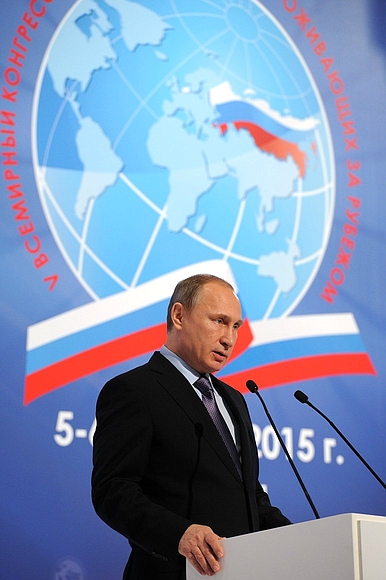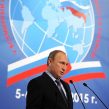
Putin and Lavrov Again Play the Ethnic Compatriot Card
Publication: Eurasia Daily Monitor Volume: 12 Issue: 207
By:

Since the 1990s, Moscow has repeatedly looked beyond Russia’s borders and pledged to come to the assistance of its allegedly victimized fellow Russian citizens, or ethnic Great Russians, or Russian speakers (all three categories apply whenever Moscow finds it desirable to play this card). Transnistria, Georgia and Ukraine each exemplifies the process by which the Russian Federation is prepared to use force to destabilize neighboring states, allegedly on the grounds that they are mistreating Russians. Moreover, Moscow subsidizes and otherwise supports a large number of organizations and movements inside all of its neighbors, from Kazakhstan to the Baltic, to ensure that the pot is kept boiling over the issue of the purported discrimination against these minority Russian communities and the Russian diaspora. Although these tactics emerged most violently in Ukraine, their origin goes back at least to Peter the Great, who legitimized his military campaigns against the Ottomans by claiming Russia was protecting the Orthodox subjects of the Ottoman Empire from discrimination. Such methods have continued to the present day.
Russian President Vladimir Putin and Foreign Minister Sergei Lavrov recently reiterated that they fully intend to again play this card to unhinge neighboring and other states. On November 5–6, they both addressed the World Congress of Compatriots, which took place in Moscow. The meeting gathered about 400 representatives of Russian expatriate communities from 97 countries, allegedly representing a global diaspora, estimated by Putin to equal 30 million people. The Russian president openly admitted he was eliciting the support of these organizations and communities to unify the domestic Russian population, as in the case of Crimea. Thus, he confirmed the inextricability of domestic and foreign policy considerations in the seizure of the Ukrainian territories of Crimea and southeastern Donbas. Equally importantly, he cited the role of the Russian Orthodox Church in, today, playing its traditional role as an arm of Russian imperialism by unifying these communities around it (Kremlin.ru, November 5).
In their remarks before members of the Russian diaspora, both Putin and Lavrov stated that “far-reaching support” for foreign compatriots has always been a state priority. They listed programs currently in place to develop contacts with these expat communities, including educational trips, international sports competitions, children’s camps, and the promotion of Russian-language associations abroad. Meanwhile the Russkiy Mir (Russian World) foundation has been allocated 6.5 billion rubles ($97 million) to support similar programs outside of Russia. Russian-language media, now appearing in 80 countries, will also be used to strengthen Moscow’s authority and influence (Kremlin.ru, November 5)
In an article written earlier, specifically for the conference, Foreign Minister Lavrov reiterated that Moscow would energetically defend its compatriots “using the entire arsenal of available methods stipulated by international law.” Moscow has twice used force in Georgia and Ukraine for these avowed purposes. And domestic legislation grants the president of the Russian Federation the express right to send forces abroad without consulting the Duma (lower house of parliament) in order to protect co-nationals abroad. Therefore, Lavrov’s caveat about “international law” seems to be little more than meaningless window dressing. In his article, Lavrov also attempts to coopt the Tatars of Russia by highlighting government programs to support the cultures and traditions of this group worldwide. Like Putin, he emphasizes the role of state organizations in providing support for compatriot organizations abroad that are actually arms of the Russian government. Furthermore, he notes, “it is hard to overestimate the role of media outlets in our cooperation with these communities.” Finally, he stresses the programs working with youth from neighboring countries as well as Russia (Mid.ru, November 3).
On one hand, such speeches and articles indicate the utter politicization in Russia of the ethnic card and diaspora for use as a state-breaking instrument abroad and a state-making one at home. But on the other hand, such an elastic, purely political concept of Russianness can and evidently is being utilized to deprive Russia’s own minorities—as well as the Crimean Tatar minority engulfed by the seizure of Crimea—of their nationality. Murat Yazydzhiev, a leader of the pro-Moscow Crimean Tatar Kyrym (Crimea) Organization, recently attacked the national movement of the Crimean Tatars and demanded that his co-nationals stop thinking about “national sovereignty” and “accept the simple idea” that “Crimean Tatars are Russians” (Belogorsknews.blogpsot.com, November 2).
These types of declarations attest to the elasticity of the concept of Russianness, which actually has no discernible ethnic context. Under Russian discourse—if it is taken to its logical conclusion—all of the Slavists in the United States could also be considered, by some measure, to be Russians meriting Moscow’s solicitude, simply because they speak or read Russian. The idea of the “Russian people” is today a fully politicized and state-propagated concept, usable for the purpose of destroying or building consolidated states in the former Soviet imperial space. As such, Putin and Lavrov are once again showing, in word and deed, that they and the government they direct are fully committed to the revision of state boundaries in this and other areas of Europe and Eurasia. And the logic of their policies points in only one direction—namely war.




